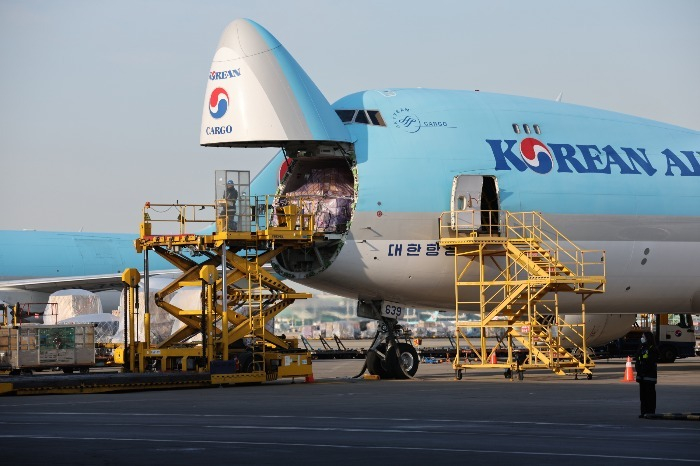Earnings
Korean Air soars with best quarterly results in its history
Recovering travel demand fuels 91% surge in 3Q operating profit
By Nov 04, 2022 (Gmt+09:00)
1
Min read
Most Read
LG Chem to sell water filter business to Glenwood PE for $692 million


Kyobo Life poised to buy Japan’s SBI Group-owned savings bank


KT&G eyes overseas M&A after rejecting activist fund's offer


StockX in merger talks with Naver’s online reseller Kream


Mirae Asset to be named Korea Post’s core real estate fund operator



Korean Air is flying high after breaking its quarterly record for the second time this year thanks to growing profits from passenger flights as well as from cargo service.
The nation's top air carrier on Thursday said that based on separate financial statements, operating profit in the third quarter year on year surged 91% to 839.2 billion won ($588 million) from sales of 3.6 trillion won, up 65%, defying all market expectations.
Domestic securities companies thus forecast the airline to earn a record-high operating profit of 2.7 trillion won for this year.
Sales from passenger flights skyrocketed an astounding 338% in the third quarter to 1.4 trillion won thanks to recovered demand for such flights with the easing of immigration regulations from September like the lifting of mandatory COVID-19 checks before arrival. The number of passengers also jumped 67% from the second quarter.
Air freight earned the company 1.8 trillion won in sales. Though this market slumped in the quarter amid the 'three high' era of high foreign exchange rates, oil prices and interest rates, Korean Air said, profits grew 13% from the prior year through flexible supply adjustment through methods like the use of irregular routes.
Another factor fueling higher profitability was a rise in belly cargo, a practice in which a carrier transports air freight on a passenger flight.
A Korean Air source said, "In the fourth quarter, we will tackle the expected decline in air freight demand by attracting as much cargo as possible from industries like textiles."
Write to Seo-Woo Jang at suwu@hankyung.com
More to Read
-
 AirlinesKorean Air to introduce new planes, spend $1.7 bn on safety
AirlinesKorean Air to introduce new planes, spend $1.7 bn on safetyNov 02, 2022 (Gmt+09:00)
1 Min read -

-
 Mergers & AcquisitionsKorean Air vows to get nod from all antitrust bodies for Asiana merger
Mergers & AcquisitionsKorean Air vows to get nod from all antitrust bodies for Asiana mergerMay 23, 2022 (Gmt+09:00)
2 Min read
Comment 0
LOG IN


